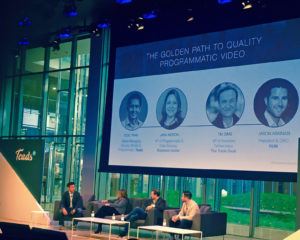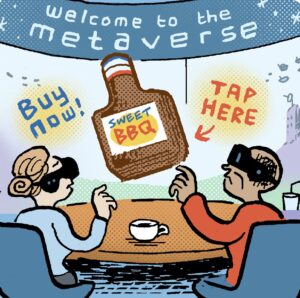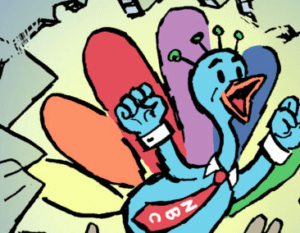 While private marketplaces (PMPs) and preferred deals are predicted to outpace open exchange buys by 2018, their rate of adoption has been inconsistent – especially when it comes to video advertising.
While private marketplaces (PMPs) and preferred deals are predicted to outpace open exchange buys by 2018, their rate of adoption has been inconsistent – especially when it comes to video advertising.
Some ad buyers have avoided PMPs out of concerns over reach, leaving some publishers twisting in the wind to accurately forecast their fill rate.
Publisher audience guarantees go a long way toward solving that problem, according to some industry experts.
“I think the audience guarantee will be a big thing,” said Jana Meron, VP of programmatic and data strategy at Business Insider, speaking during a panel at Teads’ video summit on Thursday in New York.
Business Insider invests heavily in video and notes the volume of programmatic guaranteed deals it has set up has increased 100% year over year, Meron said.
“When we think about PMPs, especially with video, we need it to be a partnership with DSPs and advertisers,” she said. “It used to be that we’d set up a [PMP] deal and pray, but we’ve had to forge deeper relationships with partners for expectations to be fulfilled on both sides.”
In video, brands sometimes prefer private deals to open exchange buys because in-banner, below-the-fold placements still run rampant.
But while video PMPs allow advertisers to maintain a direct publisher relationship at a preferred rate, the scale is nowhere near that of display.
It’s one reason why publishers such as Condé Nast support alternative video formats like outstream, which when thoughtfully placed within contextually relevant content usually performs well on metrics like view-through and duration of exposure, said Matt Starker, GM of digital for Condé Nast.
And increasingly, those formats are sold through direct deals: Teads, for instance, said 76% of its impressions are transacted through PMPs versus 24% through RTB. Most of those transactions are brand deals, not performance or direct-response buys.
Although PMPs, preferred and programmatic guaranteed deals are sometimes used interchangeably, they’re a little different in structural setup.
 Rather than just setting up a standard PMP with a set price floor (the traditional approach), a programmatic guaranteed deal requires a publisher to pledge a certain volume of impressions at a fixed rate while buyers make a budget commitment.
Rather than just setting up a standard PMP with a set price floor (the traditional approach), a programmatic guaranteed deal requires a publisher to pledge a certain volume of impressions at a fixed rate while buyers make a budget commitment.
Although a traditional PMP is structured as an auction with an invite from the publisher, many programmatic guaranteed deals mimic the direct order process – with more workflow automation.
Programmatic guaranteed deals aren’t only attracting the interest of publishers, but also major exchanges like Google’s DoubleClick, which has doubled down in this area.
Google says the number of video impressions served via programmatic guaranteed have quadrupled in the past 10 months.
The influx of demand will ease publishers’ concerns about transacting on a traditional preferred basis, according to Tim Sims, VP of inventory partnerships for The Trade Desk.
“Once publishers have more revenue assurance, you’ll start to see them graduate into more complex deals,” he predicted.
More “complex” deals may factor in more considerations beyond audience guarantees, such as viewability. For instance, a brand might ultimately want to trade up or down on CPM relative to an impression’s average viewability rate.
The growth in programmatic guaranteed is not only reliant on publisher willingness. Some buyers have unrealistic expectations about what a publisher is willing or able to provide, said Jason Askinasi, president and CRO of Publicis-owned ad platform RUN.
“People buying PMPs are used to the audience data and metrics of programmatic display that aren’t available with video,” Askinasi said. “There needs to be more education.”













